人教版英语八年级下册 单词 短语 语法
最全面人教版八年级下册英语第一单元知识点归纳总结

Unit 1 What's the matter?一、词汇与短语◆重点单词A部分1.matter n. 问题;事情2.sore adj. 疼痛的;酸痛的3.stomachache n. 胃痛;腹痛4.foot n. 脚;足5.neck n. 颈;脖子6.stomach n. 胃;腹部7.throat n. 咽喉;喉咙8.hurt v. (使)疼痛;受伤9.fever n. 发烧10.passenger n. 乘客;旅客11.lie v. 躺;平躺12.break n. 间歇;休息13.rest v. &n. 放松;休息14.onto prep. 向;朝15.X-ray n. X射线;X光16.trouble n. 问题;苦恼17.toothache n. 牙痛18.hit n. (用手或器具)击;打19.headache n. 头痛20.herself pron. (she的反身代词)她自己21.off adv. & prep. 离开(某处);不工作;从……去掉B部分1.bandage n. 绷带v. 用绷带包扎2.press v. 压;挤;按3.sick adj. 生病的;有病的4.knee n. 膝;膝盖5.breathe v. 呼吸6.knife n. 刀7.sunburned adj. 晒伤的8.blood n. 血9.ourselves pron. (we反身代词)我们自己10.mean v. 意思是;打算11.climber n. 登山者;攀登者12.importance n. 重要性;重要13.risk n.&v. 危险;风险;冒险14.decision n. 决定;抉择15.accident n.(交通)事故;意外遭遇16.control v.&n. 限制;约束;管理17.situation n. 情况;状况18.spirit n. 勇气;意志19.kilo( = kilogram) n. 千克;公斤20.death n. 死;死亡21.rock n. 岩石22.nurse n. 护士◆重点短语A部分1.have a cold 感冒2.lie down 躺下3.have a stomachache 胃痛4.take one's temperature 量体温5.have a fever 发烧6.to one's surprise 使……惊讶的是7.get off 下车8.right away 立即;马上9.take breaks (take a break) 休息10.talk too much 说得太多11.drink enough water 喝足够的水12.have a very sore throat 嗓子非常疼13.get an X-ray 拍X光片14.see a dentist 看牙医15.drink some hot tea with honey 喝一些加蜂蜜的热茶16.put some medicine on sth.在……上面敷一些药17.feel very hot 感到很热18.sound like 听起来像19.all weekend 整个周末20.in the same way 以同样的方式21.go to a doctor 看医生22.go along 沿着……走23.on the side of the road 在马路边24.shout for help 大声呼救25.without thinking twice 没有多想26.have a heart problem 有心脏病27.thanks to 多亏了;由于28.in time 及时29.save a life 挽救生命30.get into trouble 陷入麻烦31.hurt oneself 受伤32.fall down落下;摔倒B部分1.be used to 习惯于……;适应于……2.in a difficult situation 在困境中3.take risks (take a risk) 冒险4.keep on doing sth. 继续(或坚持)做某事5.run out (of) 用尽;耗尽6.make a decision 作出决定7.cut off 切除8.get hit on the head 撞到头部9.get out of 离开;从……岀来10.be interested in 对……感兴趣11.give up 放弃12.mean doing sth. 意味着做某事13.put a bandage on sth. 用绷带包扎…14.lose one's life 失去生命15.feel sick 感到恶心16.mountain climbing 登山运动17.have problems breathing 呼吸困难18.be in control of 掌管;管理◆重点句子A部分1.What's the matter with you?=What's the trouble with you?=What's wrong with you?你怎么了?2.What should she do? 她该怎么办呢?3.Did you fall down? 你跌倒了吗?4.Should I take my temperature? 我应该量一下体温吗?5.I think I sat in the same way for too long without moving.我想我以同样的姿势一动不动地坐得太久了。
(完整版)人教版英语八年级下册重点词组、句型及语法点汇总,推荐文档
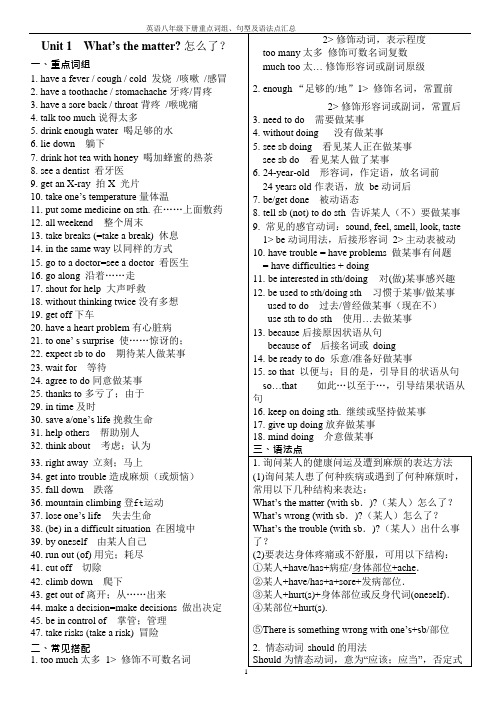
13.be back 回来14.be angry with sb 生某人的气15.throw down 扔下16.the minute=as soon as 一…就…e over 过来18.sit down 坐下19.take sb. for a walk 带某人去散步20.all the time 频繁;反复21.all day / evening 整日/夜22.shout back 大声回应23.walk away 走开24.in surprise 惊讶地25.share the housework 分担家务26.hang out 闲逛27.do chores 做杂务28.go to the store 去商店29.buy drinks and snacks 买饮料和点心30.make sb. do sth. 使某人做某事31.have enough stress from 有来自…足够的压力32.a waste of time 浪费时间33.in order to 为了34.get good grades 取得好成绩35.depend on 依赖;依靠36.have no idea 不知道37.develop children’s independence 发展孩子独立性38.look after=take care of 照顾;照看39.as a result 结果40.agree with sb 同意某人的观点/意见disagree with sb 不同意某人的观点/意见二、常见搭配1.finish doing sth. 完成做某事2.a few “几个”,后接可数名词复数few “很少,几乎没有”,后接可数名词复数a little “一点儿”,后接不可数名词little “很少,几乎没有”,后接不可数名词3.1> question “问题”,需要回答的问题,与ask或answer 搭配2> problem “问题”,需要解决的问题,与solve 搭配in the front of “在…前面”,在所说范围之内5.as…as… “与…一样…”,中间加形容词或副词原级,。
人教版八年级下册英语Unit 7单元语法知识点总结

人教版八年级下册英语Unit 7单元语法知识点总结本单元重点短语的具体用法1. as big as:与……一样大。
例如:This building is as big as that one.(这栋建筑和那栋一样大。
)2. feel free to do sth.:随意地做某事。
例如:You can feel free to ask me any questions.(你可以随意问我任何问题。
)3. one of the oldest countries:最古老的国家之一。
例如:China is one of the oldest countries in the world.(中国是世界上最古老的国家之一。
)4. risk their lives:拿生命冒险。
例如:The firefighters risk their lives to save people.(消防员们冒着生命危险去救人。
)5. as far as I know:据我所知。
例如:As far as I know, he is a very talented musician.(据我所知,他是一位非常有才华的音乐家。
)6. as you can see:正如你所看到的。
例如:As you can see, the weather is very nice today.(正如你所看到的,今天的天气非常好。
)7. be in danger:处于危险中。
例如:The pandas are in danger of extinction.(熊猫面临灭绝的危险。
)8. live up to:活到。
例如:People are living longer than ever before.(人们的寿命比以往任何时候都要长。
)9. part of...:……的组成部分。
例如:Reading is an important part of learning.(阅读是学习的重要组成部分。
人教版八年级下册英语——知识点语法归纳总结
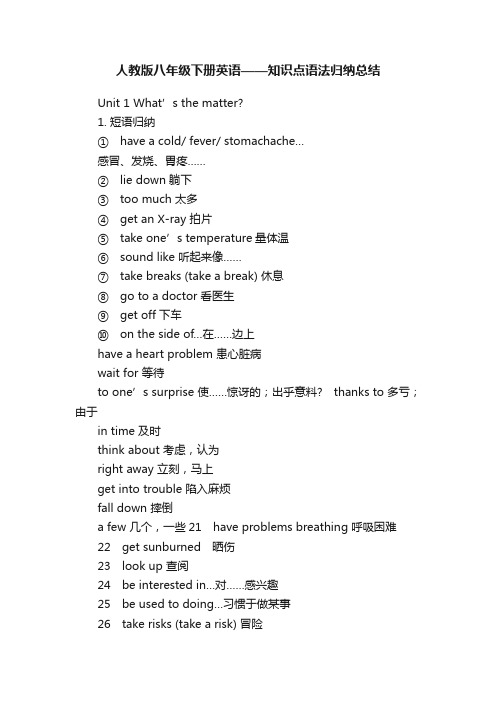
人教版八年级下册英语——知识点语法归纳总结Unit 1 What’s the matter?1. 短语归纳①have a cold/ fever/ stomachache…感冒、发烧、胃疼……②lie down 躺下③too much 太多④get an X-ray 拍片⑤take one’s temperature量体温⑥sound like 听起来像……⑦take breaks (take a break) 休息⑧go to a doctor 看医生⑨get off 下车⑩on the side of…在……边上have a heart problem 患心脏病wait for 等待to one’s surprise 使……惊讶的;出乎意料? thanks to 多亏;由于in time 及时think about 考虑,认为right away 立刻,马上get into trouble 陷入麻烦fall down 摔倒a few 几个,一些21 have problems breathing 呼吸困难22 get sunburned 晒伤23 look up 查阅24 be interested in…对……感兴趣25 be used to doing…习惯于做某事26 take risks (take a risk) 冒险27 lose one’s life 丧生28 became of 因为29 run out (of) 用尽,耗尽30 be ready to do sth. 准备做某事31 cut off 切除32 climb down 爬下33 get out of 离开;从……出来34 tell of 讲述35 the importance of (doing sth.) (做某事的)重要性36 be in control of 掌管,管理37 make a decision 做决定38 keep on doing sth. 坚持做某事39 give up 放弃40 cut/ hurt oneself 使自己受伤2. 典句必背①What’s the matter?②I have a stomachache.③What should I do?④Should I take my temperature?⑤I think you should lie down and rest.⑥If your head and neck still hurt tomorrow, then go to a doctor.⑦His love for mountain climbing is so great that he kept on climbing mountains even after this experience.3. 用法集萃(1) 当别人心情不好,身体不适或遇到麻烦时,我们可以用如下表达表示关心:What’s the matter?What’s the matter with you?What’s wrong with …?What’s the trouble\problem with …?(2) 英语中常用have描述身体的不适,此时have意为“患有”,常用结构:①have a + 疾病例:have a cold 感冒;have a fever 发烧;have a cough 咳嗽②have a + 身体部位-ache例:have a headache 头痛;have a toothache 牙痛③have a sore + 身体部位例:have a sore throat 咽喉痛;have a sore back 背痛(3) lie down躺下;tell lies/a lie 说谎含义过去式过去分词躺;平躺lay lain位于撒谎;说谎lied lied(4) maybe & may be①maybe,“或许”,常用于句首,表示可能性,后加句子。
人教版八年级下册 Unit 3 重点单词+短语+语法+话题作文(附真题和答案)
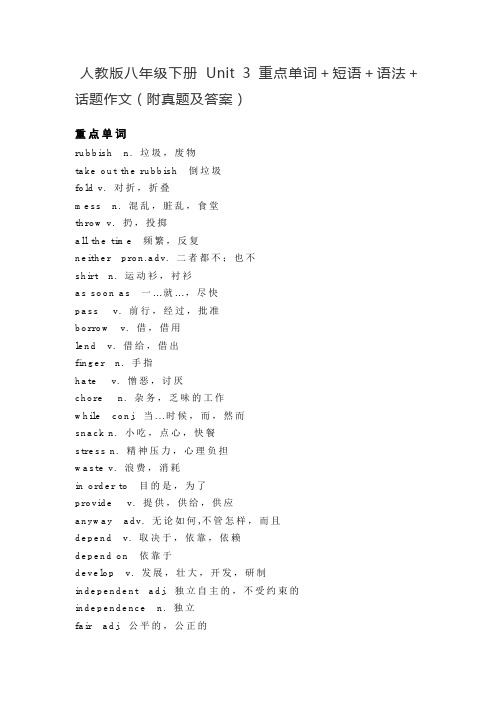
人教版八年级下册Unit 3 重点单词+短语+语法+话题作文(附真题及答案)重点单词rubbish n. 垃圾,废物take out the rubbish 倒垃圾fold v. 对折,折叠mess n. 混乱,脏乱,食堂throw v. 扔,投掷all the time 频繁,反复neither pron.adv. 二者都不;也不shirt n. 运动衫,衬衫as soon as 一…就…,尽快pass v. 前行,经过,批准borrow v. 借,借用lend v. 借给,借出finger n. 手指hate v. 憎恶,讨厌chore n. 杂务,乏味的工作while conj. 当...时候,而,然而snack n. 小吃,点心,快餐stress n. 精神压力,心理负担waste v. 浪费,消耗in order to 目的是,为了provide v. 提供,供给,供应anyway adv. 无论如何,不管怎样,而且depend v. 取决于,依靠,依赖depend on 依靠于develop v. 发展,壮大,开发,研制independent adj. 独立自主的,不受约束的independence n. 独立fair adj. 公平的,公正的unfair adj. 不公平的,有偏见的fairness n. 公正性,合理性since conj. 因为,既然neighbor n. 邻居take care of 照顾,处理ill adj. 生病的,有病的drop v. 落下,跌落重点短语1.go out for dinner 出去吃饭2.stay out late 在外面待到很晚3.go to the movies 去看电影4.get a ride 搭车5.work on 从事6.finish doing sth. 完成做某事7.clean and tidy 干净整洁的8.do the dishes 洗餐具9.take out the rubbish 倒垃圾10.fold your/the clothes 叠衣服11.sweep the floor 扫地12.make your/the bed 整理床铺13.clean the livng room 打扫客厅14.no problem 没问题15.welcome sb. 欢迎某人e home from school/work放学/下班回家17.throw down 扔下18.sit down 坐下e over 过来20.take sb. for a walk 带某人去散步21.all the time 一直;总是22.all day/evening 整曰/夜23.do housework 做家务24.shout back 大声回应25.walk away 走开26.share the housework 分担家务27.a comfortable home 一个舒适的家28.in surprise 惊讶地29.get something to drink 拿点喝的东西30.watch one show 观看一个节目31.hang out 闲逛32.pass sb. sth. 把某物传给某人33.lend sb. sth. 把某物借给某人34.get sth. wet 使某物弄湿35. hate to do sth. 讨厌做某事36.do chores 做杂务37.help sb. (to ) d o /with sth 帮助某人干某事38.bring a tent 带顶帐篷来39.buy some snacks 买些小吃40.go to the store 去商店41.invite sb. to a party 邀请某人参加聚会42.make sb. do sth. 使某人做某事43.enough stress 足够的压力44.a waste of time 浪费时间45.in order to 为了46.get good grades 取得好成绩47.mind doing sth. 介意做某事48.depend on 依赖;依靠49.develop children's independence 发展孩子的独立性50.look after/take care of 照顾;照看51.do one's part in (doing ) sth. 做某人分内的事重点句型1.Could you please clean your room?你能打扫一下你的房间吗?2. I have to do some work.我必须干些活。
八年级下册英语知识点Unit1 to Unit5 单词短语语法
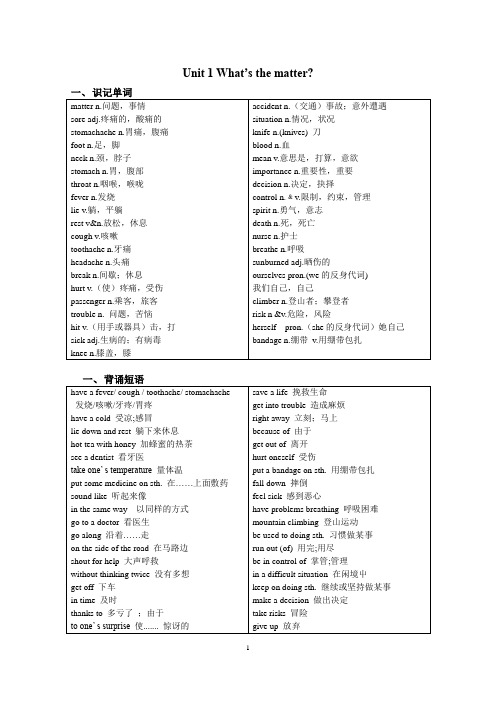
Unit 1 What’s the matter?一、识记单词matter n.问题,事情sore adj.疼痛的,酸痛的stomachache n.胃痛,腹痛foot n.足,脚neck n.颈,脖子stomach n.胃,腹部throat n.咽喉,喉咙fever n.发烧lie v.躺,平躺rest v&n.放松,休息cough v.咳嗽toothache n.牙痛headache n.头痛break n.间歇;休息hurt v.(使)疼痛,受伤passenger n.乘客,旅客trouble n. 问题,苦恼hit v.(用手或器具)击,打sick adj.生病的;有病毒knee n.膝盖,膝accident n.(交通)事故;意外遭遇situation n.情况,状况knife n.(knives) 刀blood n.血mean v.意思是,打算,意欲importance n.重要性,重要decision n.决定,抉择control n.﹠v.限制,约束,管理spirit n.勇气,意志death n.死,死亡nurse n.护士breathe n.呼吸sunburned adj.晒伤的ourselves pron.(we的反身代词)我们自己,自己climber n.登山者;攀登者risk n &v.危险,风险herself pron.(she的反身代词)她自己bandage n.绷带v.用绷带包扎一、背诵短语have a fever/ cough / toothache/ stomachache 发烧/咳嗽/牙疼/胃疼have a cold 受凉;感冒lie down and rest 躺下来休息hot tea with honey 加蜂蜜的热茶see a dentist 看牙医take one’ s temperature 量体温put some medicine on sth. 在……上面敷药sound like 听起来像in the same way 以同样的方式go to a doctor 看医生go along 沿着……走on the side of the road 在马路边shout for help 大声呼救without thinking twice 没有多想get off 下车in time 及时thanks to 多亏了;由于to one’ s surprise 使....... 惊讶的save a life 挽救生命get into trouble 造成麻烦right away 立刻;马上because of 由于get out of 离开hurt oneself 受伤put a bandage on sth. 用绷带包扎fall down 摔倒feel sick 感到恶心have problems breathing 呼吸困难mountain climbing 登山运动be used to doing sth. 习惯做某事run out (of) 用完;用尽be in control of 掌管;管理in a difficult situation 在闲境屮keep on doing sth. 继续或坚持做某事make a decision 做出决定take risks 冒险give up 放弃二、重点句型1.What’ s the matter?=What’ s the matter wit h you?= What’s the trouble with you?= What’ s wrong with you?你怎么了?2. What should she do? 她该怎么办呢?Should I take my temperature? 我应该量一下体温吗?主语+ should/shouldn’t + 动词原形. ..①You should lie down and rest. 你应该躺下休息一会儿。
人教版八年级下册英语Unit 6 知识点语法归纳总结
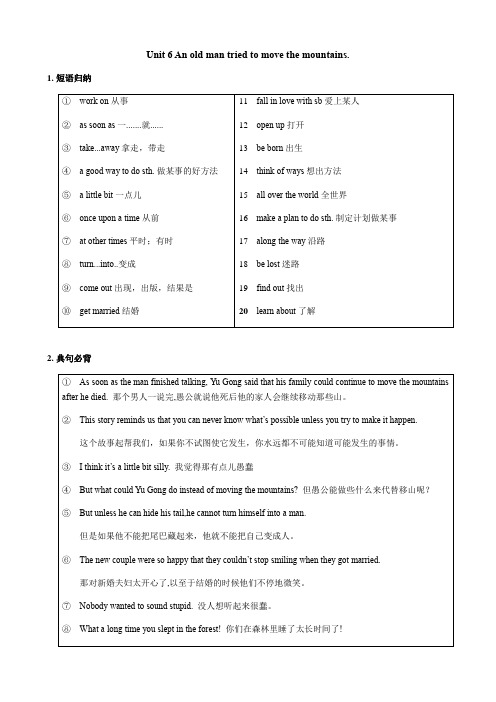
Unit 6 An old man tried to move the mountains.1.短语归纳2.典句必背3.用法集萃(1)As soon as the man finished talking, Yu Gong said that his family could continue to move themountains after he died. 那个男人一说完,愚公就说他死后他的家人会继续移动那些山。
❖as soon as表示“一...就...”,引导时间状语从句。
例:As soon as I went through customs, I jumped in a taxi. 我一过海关就跳上了一-辆计程车。
❖注意:在含as soon as、when等引导的时间状语从句的主从复合句中要遵循“主将从现”的原则,即主句如果用一般将来时,从句要用一般现在时。
(2)This story reminds us that you can never know what’s possible unless you try to make it happen.这个故事起帮我们,如果你不试图使它发生,你水远都不可能知道可能发生的事情。
❖remind作动词,意为“提醒;使想起”。
常见的搭配有:(3)I think it’s a little bit silly. 我觉得那有点儿愚蠢❖ a little bit是固定搭配,意为“有点儿;稍微”,用来修饰形容词或副词。
例:Your bedroom is a little bit dirty. Please clean it up.你的卧室有点儿脏。
请把它打扫干净。
Mike checked the papers a little bit carelessly, so he failed the exam again.迈克在检查试卷的时候有点儿粗心,所以他考试又没有及格。
Unit1词汇,短语,语法归纳人教版八年级英语下册

八下 unit 1 语法归纳总结询问某人的健康问题及遇到事情麻烦等常用的表达方式1 What's the matter (with xx)?(某人)怎么了?2 What's wrong (with xx)?(某人)怎么了?3 What's the trouble (with xx)?(某人)怎么了?4 What happened (to xx)?(某人)发生了什么事?5 Are you OK? 你没事吧?6 Is there anything wrong with xx? 某人有什么事吗?练一练: What's the matter with your leg? ﹦________ ________ ________ ________ __________?﹦________ ________ ________ ________ __________?表达身体疼痛或不舒服,可用如下结构1. sb + have/ has + 病症Eg: Sb has/ have a cold/ bad cold/ cough/ fever/ temperature/ nosebleed某人有感冒,重感冒,咳嗽,发烧,出鼻血2.sb + has/have + a + 身体部位 + acheEg: Sb has/have a headache / toothache/ earache/ backache/ heartache/ stomachache 某人头痛,牙痛,耳朵疼,后背痛,心痛,胃痛3. sb + has/ have + a sore +发病部位Eg: Sb has/have a sore throat/ eye/ back/ arm某人嗓子疼,眼睛疼,后背疼,胳膊疼4. sb + has/have a pain (pains) in one's + 身体部位Eg:Sb has/have a pain in sb's head/ neck 某人头痛,脖子痛5. sb的某部位 + hurt(hurts)注:hurt的过去式,过去分词还是hurteg: My head hurts. 我头痛 His legs hurts。
人教版英语八年级下册知识点总结

八年级英语下册语法知识复习1.should 情态动词,应该,应当,用于询问,提出建议,或表达职责和义务。
如:What should I do? You should have a talk with your parents。
could 也可以提出建议,比较委婉.如: You could write him a letter。
could还用于礼貌地请求,如:Could you please clean your room? 否定句式:Could you please not do sth?其他常用情态动词:must必须,have to必须,不得不,may可能,可以,can能,会,可能,可以need需要。
情态动词+动词原形作谓语。
2.非谓语动词形式(一)动词不定式结构:to+动词原形或不带to。
否定:not+to do或not do句法功能:1)主语:常用it作形式主语,不定式为真正的主语:It is +形容词+for sb。
to do sth.It is important to keep fit。
=To keep fit is important.2)宾语:(1)直接宾语:想,喜欢,希望:want,like, love,would like,hope, expect;决定同意拒绝开始学习:decide,agree, refuse, begin,start, learn, 需要计划帮助提供:need, plan,help,offer+ to do(划线的动词还可以接doing)如:I’ll help to clean up the city parks。
(宾语)疑问词(what, who, which,where, when ,how,)+to do 作宾语I don’t know what to say. 我不知道说什么。
(2)宾补:tell,ask,want,wish,allow,invite,help,encourage,teach等+ sb. to do (hope不能接sb。
人教版初中英语八年级下册全册各单元知识点、语法归纳整理
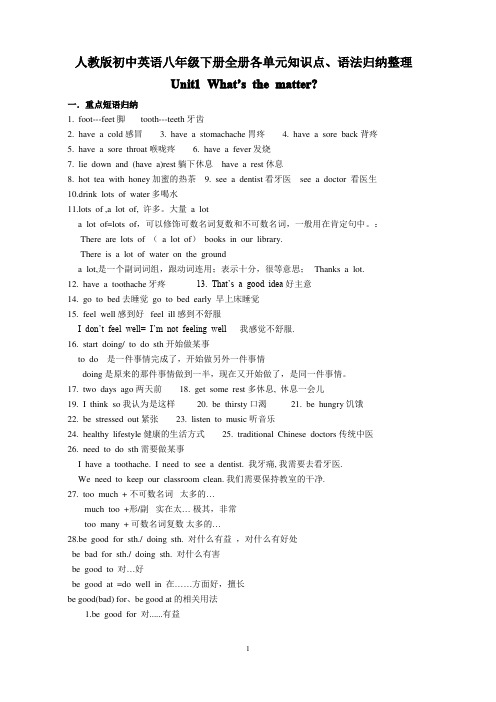
人教版初中英语八年级下册全册各单元知识点、语法归纳整理Unit1W hat’s the matter?一.重点短语归纳1.foot---feet脚tooth---teeth牙齿2.have a cold感冒3.have a stomachache胃疼4.have a sore back背疼5.have a sore throat喉咙疼6.have a fever发烧7.lie down and(have a)rest躺下休息have a rest休息8.hot tea with honey加蜜的热茶9.see a dentist看牙医see a doctor看医生10.drink lots of water多喝水11.lots of ,a lot of,许多。
大量a lota lot of=lots of,可以修饰可数名词复数和不可数名词,一般用在肯定句中。
:There are lots of(a lot of)books in our library.There is a lot of water on the grounda lot,是一个副词词组,跟动词连用;表示十分,很等意思;Thanks a lot.12.have a toothache牙疼13.That’s a good idea好主意14.go to bed去睡觉go to bed early早上床睡觉15.feel well感到好 feel ill感到不舒服I don’t feel well=I’m not feeling well我感觉不舒服.16.start doing/to do sth开始做某事to do是一件事情完成了,开始做另外一件事情doing是原来的那件事情做到一半,现在又开始做了,是同一件事情。
17.two days ago两天前18.get some rest多休息,休息一会儿19.I think so我认为是这样20.be thirsty口渴21.be hungry饥饿22.be stressed out紧张23.listen to music听音乐24.healthy lifestyle健康的生活方式25.traditional Chinese doctors传统中医26.need to do sth需要做某事I have a toothache.I need to see a dentist.我牙痛,我需要去看牙医.We need to keep our classroom clean.我们需要保持教室的干净.27.too much+不可数名词太多的…much too+形/副实在太…极其,非常too many+可数名词复数太多的…28.be good for sth./doing sth.对什么有益,对什么有好处be bad for sth./doing sth.对什么有害be good to对…好be good at=do well in在……方面好,擅长be good(bad) for、be good at的相关用法1.be good for对......有益Doing morning exercises is good for your health.做早操对你们的建康有益。
人教版八年级下册英语Unit 4 知识点语法归纳总结

Unit 4 Why don’t you talk to your parents?1.短语归纳2.典句必背3.用法集萃(1)My parents don't allow me to hang out with my friends. 我的父母不允许我和我的朋友们出去闲逛。
❖allow作动词,意为“允许;准许”。
allow sb. to do sth. 意为“允许某人做某事”,也可以是allow sb. sth.例:His parents won't allow him to stay out late. 他的父母不允许他在外面待到很晚。
Each passenger is allowed 20 kilograms of baggage. 每位旅客准许携带20千克行李。
❖allow sb. to do sth.的被动结构是:“sb. be allowed to do sth.” 某人被允许做某事例:We are allowed to choose our own clothes. 我们被允许选择自己的衣服。
The children are not allowed to play on this lawn. 孩子们不准在这块草地上玩耍。
(2)What’s wrong?怎么了?❖wrong作形容词,意为“有毛病的;错误的”例:There’s something wrong with my bike. 我的自行车出毛病了。
I’m sorry to tell you that your answers are wrong. 我很遗憾地告诉你,你的答案错了。
❖拓展:wrong的延伸(3)I’m really tired because I studied until midnight last night.我真的很累,因为我昨天晚上一直学习到半夜。
❖because是连词,意为“因为”,引导原因状语从句。
人教版八年级英语下册单词,短语,句型和语法总结

Unit1 What’s the matter?【重点单词】matter [ˈmætə] v. 重要,要紧,有关系What’s the matter? 怎么了?出什么事了?sore [sɔ:(r)] adj. 疼痛的,酸痛的have a cold 感冒stomach ['stʌmək] n. 胃,腹部stomachache ['stʌməkeɪk] n. 胃痛,腹痛have a stomachache 胃痛foot(复数feet) [fu:t] n. 脚neck [nek] n. 颈,脖子throat [θrəʊt] n. 喉咙fever ['fi:və] n. 发烧,发热lie [laɪ] v. 躺,平躺lie down 躺下rest [rest] n. 剩余部分,其余;放松,休息cough [kɒf] n. & v. 咳嗽X-ray ['eksreɪ] n. X光,X射线toothache [ˈtu:θeɪk] n. 牙痛take one's temperature 量体温headache [ˈhedeɪk] n. 头痛have a fever 发烧break [breɪk] n. & v. 休息,暂停;打破take breaks (take a break)休息hurt [hə:t] v. 伤害,损害,使受伤passenger ['pæsɪndʒə] n. 乘客,旅客off [ɒf] adv. prep. 离开(某处);从…去掉get off 下车to one's surprise 使…惊讶,出乎…意料onto [ˈɒntə] prep. 向,朝trouble [ˈtrʌbl] n. 麻烦,烦扰,问题hit [hit] n. & v. 碰撞,打,打击right away 立即,马上get into 陷入,参与herself [hə:ˈself] pron. 她自己,她本身(she的反身代词)bandage ['bændɪdʒ] n. & v. 绷带;用绷带包扎sick [sɪk] adj. 患病的,不适的knee [ni:] n. 膝盖nosebleed [ˈnəʊzbli:d] n. 鼻出血breathe [bri:ð] v. 呼吸sunburned [ˈsʌnbɜ:nd] adj. 晒伤的ourselves [ɑ:ˈselvz] pron. 我们自己(we的反身代词)climber [ˈklaɪmə(r)] n. 登山者be used to 习惯于… 适应于…risk [rɪsk] n. & v. 风险,危险;冒险take risks (take a risk) 冒险accident [ˈæksidənt] n. 意外事件;事故situation [ˌsitjuˈeiʃən] n. 状况,形式,情况kg=kilogram [ˈkɪləgræm] n. 公斤,千克rock [rɔk] n. 岩石run out (of) 用尽,耗尽knife [naif] n. 刀,餐刀cut off 切除blood [blʌd] n. 血mean [mi:n] v. 意味着,意思是,意欲get out of 离开,从… 出来importance [ɪmˈpɔ:tns] n. 重要性decision [dɪ'sɪʒn] n. 决心,决定,抉择control [kən'trəʊl] v. 控制,支配,操纵be in control of 掌管,管理spirit ['spɪrɪt] n. 勇气,意志death [deθ] n. 死亡give up 放弃nurse [nə:s] n. 护士【重点短语】1.have a fever 发烧2.have a cough 咳嗽3.have a toothache 牙疼4.talk too much 说得太多5.drink enough water 喝足够的水6.have a cold 受凉;感冒7.have a stomachache 胃疼8.have a sore back 背疼9.have a sore throat 喉咙痛10. take risks 冒险11.hot tea with honey 加蜂蜜的热茶12.see a dentist 看牙医13.get an X-ray 拍X 光片14.take one’ s temperature 量体温15.put some medicine on sth. 在……上面敷药16. give up 放弃17. sound like 听起来像18. all weekend 整个周末19. in the same way 以同样的方式20. go to a doctor 看医生21. go along 沿着……走22. on the side of the road 在马路边23. shout for help 大声呼救24. without thinking twice 没有多想25. get off 下车26. have a heart problem 有心脏病27. to one’ s surprise 另某人惊讶的是28. thanks to 多亏了;由于29. in time 及时30. make a decision 做出决定31. get into trouble 造成麻烦32. right away 立刻;马上33. because of 由于34. get out of 离开;从……出来35. keep on doing sth. 继续或坚持做某事36. put a bandage on sth. 用绷带包扎37. fall down 摔倒38. feel sick 感到恶心39. have a nosebleed 流鼻血40. cut his knee 割伤他的膝盖41. put her head back 把她的头向后仰42. have problems breathing 呼吸困难43. mountain climbing 登山运动44. be used to doing sth. 习惯做某事45. run out (of) 用完;用尽46. so that 以便47. so...that... 如此……以至于...…48. be in control of 掌管;管理49. in a difficult situation 在闲境中【重点句型】1. What's the matter with you?= What'the trouble with you?= What's wrong with you? 你怎么了?2. What should she do? 她该怎么办呢?3.Should I take my temperature? 我应该量一下体温吗?4.You should lie down and rest. 你应该躺下休息一会儿。
Unit2词汇,短语,语法归纳人教版八年级英语下册
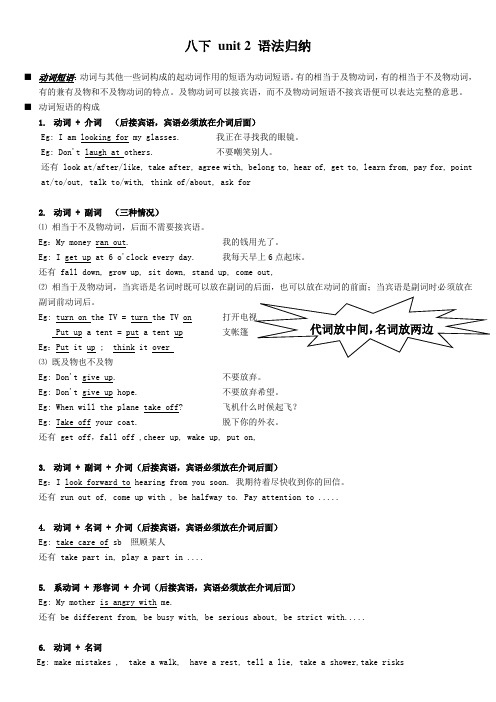
八下unit 2 语法归纳■动词短语:动词与其他一些词构成的起动词作用的短语为动词短语。
有的相当于及物动词,有的相当于不及物动词,有的兼有及物和不及物动词的特点。
及物动词可以接宾语,而不及物动词短语不接宾语便可以表达完整的意思。
■动词短语的构成1.动词 + 介词(后接宾语,宾语必须放在介词后面)Eg: I am looking for my glasses. 我正在寻找我的眼镜。
Eg: Don't laugh at others. 不要嘲笑别人。
还有 look at/after/like, take after, agree with, belong to, hear of, get to, learn from, pay for, point at/to/out, talk to/with, think of/about, ask for2.动词 + 副词(三种情况)⑴相当于不及物动词,后面不需要接宾语。
Eg:My money ran out. 我的钱用光了。
Eg: I get up at 6 o'clock every day. 我每天早上6点起床。
还有 fall down, grow up, sit down, stand up, come out,⑵相当于及物动词,当宾语是名词时既可以放在副词的后面,也可以放在动词的前面;当宾语是副词时必须放在Eg: turn on the TV = turn the TV onPut up a tent = put a tent up 支帐篷Eg:Put it up ; think it over⑶既及物也不及物Eg: Don't give up. 不要放弃。
Eg: Don't give up hope. 不要放弃希望。
Eg: When will the plane take off? 飞机什么时候起飞?Eg: Take off your coat. 脱下你的外衣。
人教版初二英语下册Unit2I'llhelptocleanupthecityparks.短语语法知识

人教版初二英语下册Unit2I'llhelptocleanupthecityparks【课本内容剖析】Section A1.You could help to clean up the city parks. (P. 9)(1) ① help sb. with sth. 帮助某人某事翻译:你能在家庭作业方面帮助我吗?_______________________________① help sb. (to) do sth. 帮助某人做某事翻译:他常常帮助他妈妈做家务。
___________________________________(2)clean up意为“排除干净”翻译:Nancy, please clean up your room. _______________________________2.The girl could visit the sick kids in the hospital to cheer them up. (P. 9) cheer up意为“使高兴, 使振作、振奋”,代词用作宾语时,要当在cheer和up之间。
翻译:Cheer up! Everything will be OK. __________________________________3.The boy could give out food at the food bank. (P. 9)give out意为“分发、散发”,相当于hand out。
翻译:这有一些书。
请把它们分发给同砚们。
______________________________________________________________4.The girl could volunteer in an after-school study program to teach kids. (P. 9) volunteer用作动词,表示“义务做、自愿做”,后接不定式作宾语,volunteer to do sth.“志愿做某事”;作名词,表示“志愿者”,为可数名词。
人教版八年级下册英语Unit 3单元语法知识点总结

人教版八年级下册英语Unit 3单元语法知识点总结本单元重点短语的具体用法1. do the dishes:洗餐具- I need to do the dishes before going out.(我出门前需要洗餐具。
)2. take out the rubbish:倒垃圾- Can you take out the rubbish, please?(你能倒一下垃圾吗?)3. fold your clothes:叠衣服- Remember to fold your clothes neatly.(记得把你的衣服叠整齐。
)4. sweep the floor:扫地- She sweeps the floor every day.(她每天都扫地。
)5. make your bed:整理床铺- It's your turn to make your bed.(轮到你整理床铺了。
)6. clean the living room:打扫客厅- We need to clean the living room before guests arrive.(在客人到来之前,我们需要打扫客厅。
)7. go out for dinner:出去吃饭- Let's go out for dinner tonight.(我们今晚出去吃饭吧。
)8. go to the movies:去看电影- They like to go to the movies on weekends.(他们喜欢在周末去看电影。
)9. stay out late:在外面待到很晚- Don't stay out late, it's not safe.(别在外面待太晚,不安全。
)10. get a ride:搭车- I'll get a ride with my friend.(我会和我朋友一起搭车。
)11. work on doing sth:从事做某事- He is working on writing a novel.(他正在写一本小说。
人教版八年级下册各单元英语语法解析知识重点总结
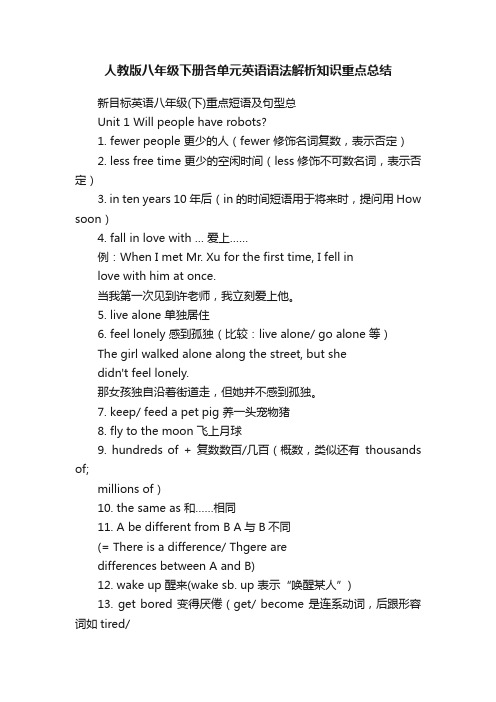
人教版八年级下册各单元英语语法解析知识重点总结新目标英语八年级(下)重点短语及句型总Unit 1 Will people have robots?1. fewer people 更少的人(fewer 修饰名词复数,表示否定)2. less free time 更少的空闲时间(less 修饰不可数名词,表示否定)3. in ten years 10年后(in 的时间短语用于将来时,提问用How soon)4. fall in love with … 爱上……例:When I met Mr. Xu for the first time, I fell inlove with him at once.当我第一次见到许老师,我立刻爱上他。
5. live alone 单独居住6. feel lonely 感到孤独(比较:live alone/ go alone 等)The girl walked alone along the street, but shedidn't feel lonely.那女孩独自沿着街道走,但她并不感到孤独。
7. keep/ feed a pet pig 养一头宠物猪8. fly to the moon 飞上月球9. hundreds of + 复数数百/几百(概数,类似还有thousands of;millions of)10. the same as 和……相同11. A be different from B A与B不同(= There is a difference/ Thgere aredifferences between A and B)12. wake up 醒来(wake sb. up 表示“唤醒某人”)13. get bored 变得厌倦(get/ become 是连系动词,后跟形容词如tired/angry/ excited 等)14. go skating 去滑冰(类似还有go hiking/ fishing /skating/ bike riding 等)15. lots of/ a lot of 许多(修饰可数名词、不可数名词都可以)16. at the weekends 在周末17. study at home on computers 在家通过电脑学习18. agree with sb. 同意某人(的意见)19. I don't agree. = I disagree. 我不同意。
人教版英语八年级下册 单词 短语 语法
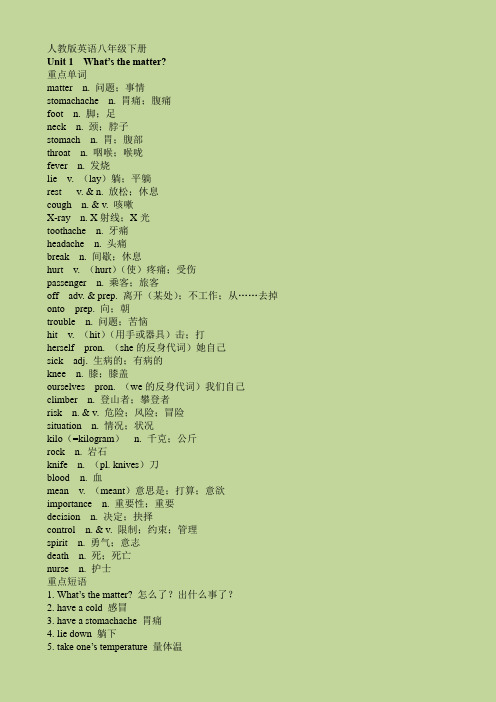
人教版英语八年级下册Unit 1What’s the matter?重点单词matter n. 问题;事情stomachache n. 胃痛;腹痛foot n. 脚;足neck n. 颈;脖子stomach n. 胃;腹部throat n. 咽喉;喉咙fever n. 发烧lie v. (lay)躺;平躺rest v. & n. 放松;休息cough n. & v. 咳嗽X-ray n. X射线;X光toothache n. 牙痛headache n. 头痛break n. 间歇;休息hurt v. (hurt)(使)疼痛;受伤passenger n. 乘客;旅客off adv. & prep. 离开(某处);不工作;从……去掉onto prep. 向;朝trouble n. 问题;苦恼hit v. (hit)(用手或器具)击;打herself pron. (she的反身代词)她自己sick adj. 生病的;有病的knee n. 膝;膝盖ourselves pron. (we的反身代词)我们自己climber n. 登山者;攀登者risk n. & v. 危险;风险;冒险situation n. 情况;状况kilo(=kilogram)n. 千克;公斤rock n. 岩石knife n. (pl. knives)刀blood n. 血mean v. (meant)意思是;打算;意欲importance n. 重要性;重要decision n. 决定;抉择control n. & v. 限制;约束;管理spirit n. 勇气;意志death n. 死;死亡nurse n. 护士重点短语1. What’s the matt er? 怎么了?出什么事了?2. have a cold 感冒3. have a stomachache 胃痛4. lie down 躺下5. take one’s temperature 量体温6. have a fever 发烧7. take breaks(take a break)休息8. get off 下车9. to one’s surprise 使……惊讶的;出乎……意料10. right away 立即;马上11. get into 陷入;参与12. be used to 习惯于……;适应于……13. take risks(take a risk) 冒险14. run out (of) 用尽;耗尽15. cut off 切除16. get out of 离开;从……出来17. be in control of 掌管;管理18. give up 放弃重点句型1. —What’s the matter?—I have a stomachache.2. —W hat’s the matter with Ben?—He hurt himself. He has a sore back.3. —Do you have a fever?—Yes, I do. / No, I don’t./I don’t know.4. —Does he have a toothache?—Yes, he does.5. —What should she do?—She should take her temperature.6. —Should I put some medicine on it?—Yes, you should. / No, you shouldn’t.7. You shouldn’t eat so much next time.He should lie down and rest.He should see a dentist and get X-ray.重点语法1. have在涉及健康问题的句子中的应用。
人教版初中英语八年级下册语法知识点
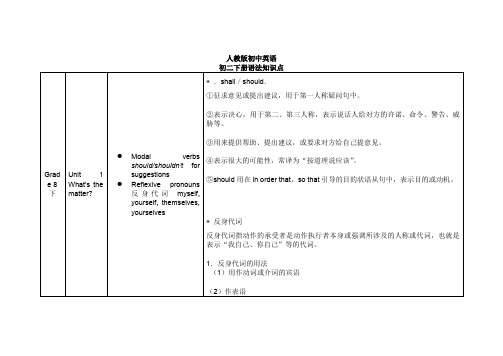
4.动词+副词+介词(其后需加宾语)
5.动词+名词(其后不加宾语)
make a bed整理床铺take place发生make faces做鬼脸
6.动词+名词+介词(其后需加宾语)
It is very kind of you to help me.=You are very kind to help me.你帮我的忙,太谢谢你了。
5.疑问词和不定式连用和疑问词连用的不定式在句中相当于名词,常作主语、宾语、表语、同位语等。
6.省略to的不定式
(1)当两个(或两个以上的)不定式由and,or,than等连接时,通常只需在第一个不定式前用to,其余不定式前的to可省略。
4)当某些结构后的不定式动作与句中某一动作重复时,不定式符号to之后的其他成分可以省略,只保留不定式符号to。常见结构有:be able to,be going to,have to,ought to,used to等。
8.不定式的主动表示被动
①在“be+性质形容词+不定式”结构中。
此类形容词有easy,hard,difficult,interesting,heavy,pleasant,comfortable,safe,dangerous,impossible等。
4.不定式的复合结构不定式用for和of引出逻辑主语,带有逻辑主语的不定式称为不定式的复合结构。不定式的复合结构在句中可作主语、宾语、定语等。
当作表语的形容词表示人的性格、品质时,常用of引出不定式的逻辑主语,否则用for引出。常见的表示性格、品质的形容词有:
good好的kind和蔼的brave勇敢的honest诚实的lazy懒惰的nice好的wise明智的clever聪明的silly傻的stupid笨的foolish愚蠢的right正确的wrong错的rude粗鲁的polite礼貌的fair公正的unfair不公正的careless粗心的careful细心的patient耐心的
- 1、下载文档前请自行甄别文档内容的完整性,平台不提供额外的编辑、内容补充、找答案等附加服务。
- 2、"仅部分预览"的文档,不可在线预览部分如存在完整性等问题,可反馈申请退款(可完整预览的文档不适用该条件!)。
- 3、如文档侵犯您的权益,请联系客服反馈,我们会尽快为您处理(人工客服工作时间:9:00-18:30)。
人教版英语八年级下册Unit 1What’s the matter?重点单词matter n、问题;事情stomachache n、胃痛;腹痛foot n、脚;足neck n、颈;脖子stomach n、胃;腹部throat n、咽喉;喉咙fever n、发烧lie v、(lay)躺;平躺rest v、& n、放松;休息cough n、& v、咳嗽X-ray n、X射线;X光toothache n、牙痛headache n、头痛break n、间歇;休息hurt v、(hurt)(使)疼痛;受伤passenger n、乘客;旅客off adv、& prep、离开(某处);不工作;从……去掉onto prep、向;朝trouble n、问题;苦恼hit v、(hit)(用手或器具)击;打herself pron、(she的反身代词)她自己sick adj、生病的;有病的knee n、膝;膝盖ourselves pron、(we的反身代词)我们自己climber n、登山者;攀登者risk n、& v、危险;风险;冒险situation n、情况;状况kilo(=kilogram)n、千克;公斤rock n、岩石knife n、(pl、knives)刀blood n、血mean v、(meant)意思就是;打算;意欲importance n、重要性;重要decision n、决定;抉择control n、& v、限制;约束;管理spirit n、勇气;意志death n、死;死亡nurse n、护士重点短语1、What’s the mat ter? 怎么了?出什么事了?2、have a cold 感冒3、have a stomachache 胃痛4、lie down 躺下5、take one’s temperature 量体温6、have a fever 发烧7、take breaks(take a break) 休息8、get off 下车9、to one’s surprise 使……惊讶的;出乎……意料10、right away 立即;马上11、get into 陷入;参与12、be used to 习惯于……;适应于……13、take risks(take a risk) 冒险14、run out (of) 用尽;耗尽15、cut off 切除16、get out of 离开;从……出来17、be in control of 掌管;管理18、give up 放弃重点句型1、—What’s the matter?—I have a stomachache、2、—W hat’s the matter with Ben?—He hurt himself、He has a sore back、3、—Do you have a fever?—Yes, I do、/ No, I don’t、/I don’t know、4、—Does he have a toothache?—Yes, he does、5、—What should she do?—She should take her temperature、6、—Should I put some medicine on it?—Yes, you should、/ No, you should n’t、7、You shouldn’t eat so much next time、He should lie down and rest、He should see a dentist and get X-ray、重点语法1、have在涉及健康问题的句子中的应用。
2、情态动词should与shouldn’t表“建议”、“提议”或“请求”等。
3、反身代词。
4、see sb、doing sth、表示“瞧到某人正在从事某事或正处于某种状态”5、thanks to sb、/sth、表示“多亏;因为;由于”。
Unit 2I’ll help to clean up the city parks、重点单词cheer v、欢呼;喝彩volunteer v、义务做;自愿做n、志愿者sign n、标志;信号notice n、通知;公告;注意v、注意到;意识到lonely adj、孤独的;寂寞的several pron、几个;数个;一些strong adj、强烈的;强壮的feeling n、感觉;感触satisfaction n、满足;满意joy n、高兴;愉快owner n、物主;主人journey n、(尤指长途)旅行;行程raise v、募集;征集alone adv、独自;单独repair v、修理;修补fix v、修理;安装broken adj、破损的;残缺的wheel n、车轮;轮子letter n、信;函Miss n、女士;小姐disabled adj、丧失能力的;有残疾的blind adj、瞎的;失明的deaf adj、聋的imagine v、想象;设想difficulty n、困难;难题open v、开;打开door n、门carry v、拿;提;扛train v、训练;培训excited adj、激动的;兴奋的training n、训练;培训kindness n、仁慈;善良clever adj、聪明的;聪颖的understand v、理解;领会change v、& n、变化;改变interest n、兴趣;关注v、使感兴趣;使关注sir n、先生(用于正式信函中对不知名的男性收信人的称呼时,写为Sir)madam n、夫人;女士(用于正式信函中对不知名的女性收信人的称呼时,写为Madam) 重点短语1、clean up 打扫(清除)干净2、cheer up (使)变得更高兴;振奋起来3、give out 分发;散发4、come up with 想出;提出(主意、计划、回答等)5、put off 推迟6、hand out 分发7、call up 打电话给(某人);征召8、used to 曾经……;过去……9、care for 照顾;非常喜欢10、try out 参加……选拔;试用11、fix up 修理;装饰12、give away 赠送;捐赠13、take after (外貌或行为)像14、set up 建起;设立15、make a difference 影响;有作用重点句型1、I’d like to help homeless people、She decided to try out for a volunteer after-school reading program、2、You could ask hospitals to let you visit the kids and cheer them up、Mario believes it can help him to get his future dream job、3、She volunteers there once a week to help kids learn to read、I’m making some signs to put up around the school、重点语法1、动词不定式作宾语;状语与宾语补足语。
2、情态动词could表建议的用法。
3、动词短语。
Unit 3Could you please clean your room?重点单词rubbish n、垃圾;废弃物fold v、折叠;对折sweep v、(swept)扫;打扫floor n、地板mess n、杂乱;不整洁throw v、扔;掷neither adv、也不shirt n、衬衫pass v、给;递;走过;通过borrow v、借;借用lend v、借给;借出finger n、手指hate v、厌恶;讨厌while conj、与……同时;当……的时候;而;然而stress n、精神压力;心理负担waste n、浪费;垃圾v、浪费;滥用provide v、提供;供应anyway adv、而且;加之depend v、依靠;信赖develop v、发展;壮大fairness n、公正性;合理性since conj、因为;既然prep、, conj、& adv、从……以后;自……以来neighbor n、邻居ill adj、有病;不舒服drop v、落下;掉下fair adj、合理的;公正的unfair adj、不合理的;不公正的重点短语1、take out the rubbish 倒垃圾2、all the time 频繁;反复3、as soon as 一……就……;尽快4、in order to 目的就是;为了5、depend on 依靠;信赖6、take care of 照顾;处理重点句型1、—Could I go out for dinner with my friends?—Sure, that should be OK、2、—Could we get something to drink after the movie? —No, you can’t、You have a basketball game tomorrow、3、—Could you please take the dog for a walk?—OK, but I want to watch one show first、4、—Could you please take out the rubbish?—Yes, sure、重点语法1、Could表礼貌的请求或者请求允许。
Unit 4Why don’t you talk to your parents?重点单词allow v、允许;准许wrong adj、有毛病;错误的guess v、猜测;估计deal n、协议;交易relation n、关系;联系;交往communication n、交流;沟通argue v、争吵;争论cloud n、云;云朵elder adj、年纪较长的instead adv、代替;反而;却whatever pron、任何;每一nervous adj、焦虑的;担忧的offer v、主动提出;自愿给予proper adj、正确的;恰当的secondly adv、第二;其次communicate v、交流;沟通explain v、解释;说明clear adj、清楚易懂的;晴朗的copy v、抄袭;模仿;复制;复印return v、归还;回来;返回anymore adv、(常用于否定句与疑问句末)再也(不);(不)再member n、成员;分子pressure n、压力compete v、竞争;对抗opinion n、意见;想法;瞧法skill n、技艺;技巧typical adj、典型的football n、(美式)橄榄球;足球quick adj、快的;迅速的;时间短暂的continue v、持续;继续存在compare v、比较crazy adj、不理智的;疯狂的push v、鞭策;督促;推动development n、发展;发育;成长cause v、造成;引起usual adj、通常的;寻常的perhaps adv、可能;大概;也许重点短语1、What’s wrong? 哪儿不舒服?2、look through快速查瞧;浏览3、big deal 重要的事4、work out 成功地发展;解决5、get on with 与睦相处;关系良好6、cut out 删除;删去7、compare…with 比较;对比8、in one’s opinion 依……瞧重点句型1、—You look tired、What’s the matter?—I studied until midnigh t last night so I didn’t get enough sleep、2、—What should I do?—Why don’t you forget about it? Although she’s wrong, it’s not a big deal、3、—What should he do?—He should talk to his friend so that he can say he’s sorry、4、—Maybe you could go to his house、—I guess I could, but I don’t want to surprise him、重点语法1、Why don’t you …? 给出建议。
